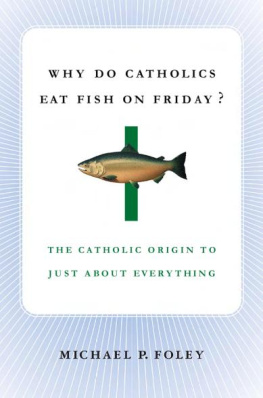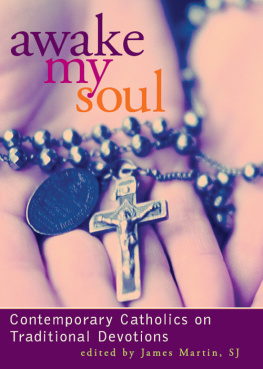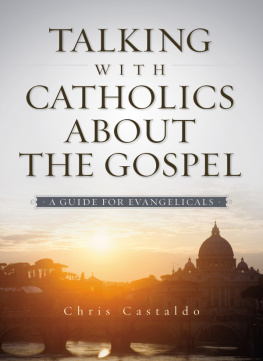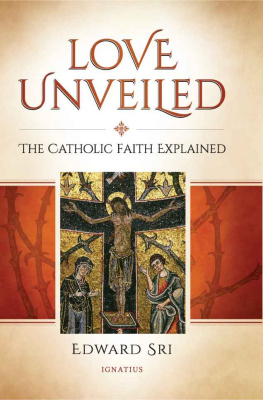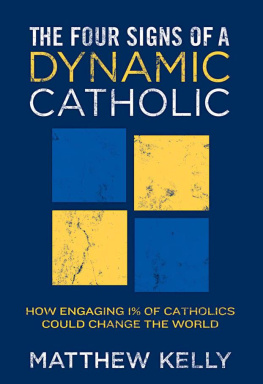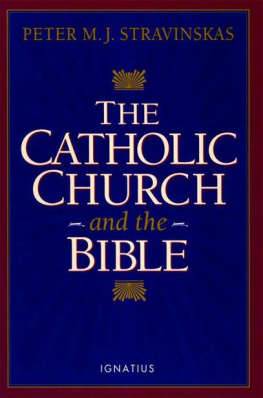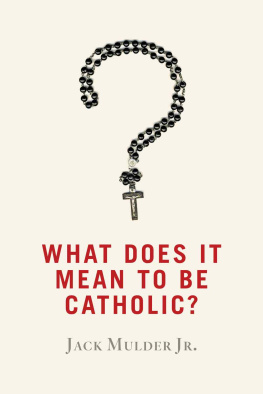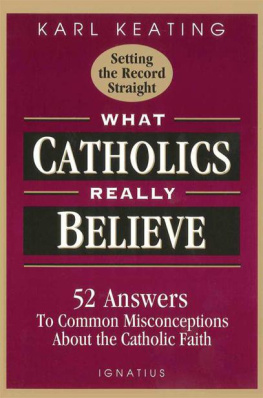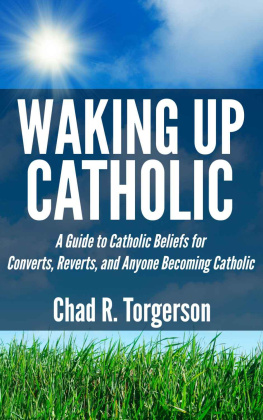WHY DO CATHOLICS
EAT FISH ON FRIDAY?
THE CATHOLIC ORIGIN TO
JUST ABOUT EVERYTHING
MICHAEL P. FOLEY


WHY DO CATHOLICS EAT FISH ON FRIDAY?:
THE CATHOLIC ORIGIN TO JUST ABOUT EVERYTHING
Copyright Michael P. Foley, 2005.
All rights reserved. No part of this book may be used or reproduced in any manner whatsoever without written permission except in the case of brief quotations embodied in critical articles or reviews.
First published 2005 by
PALGRAVE MACMILLAN
175 Fifth Avenue, New York, N.Y. 10010 and
Houndmills, Basingstoke, Hampshire, England RG21 6XS.
Companies and representatives throughout the world.
PALGRAVE MACMILLAN is the global academic imprint of the Palgrave Macmillan division of St. Martins Press, LLC and of Palgrave Macmillan Ltd. Macmillan is a registered trademark in the united states, united Kingdom and other countries. Palgrave is a registered trademark in the European Union and other countries.
ISBN 1-4039-6967-1 paperback
Library of Congress Cataloging-in-Publication Data
Foley, Michael P., 1970-
Why do Catholics eat fish on Friday?: the Catholic origin to just about everything/by Michael P. Foley.
p. cm
Includes bibliographical references and index.
ISBN 1-4039-6967-1
1. Catholic ChurchMiscellanea. I. Title.
BX1754.F597 2005
282dc22
2005047524
A catalogue record for this book is available from the British Library.
Design by Letra Libre, Inc.
First edition: Pub Month Year
10 9 8 7 6 5 4 3 2 1
Printed in the United States of America
This volume is dedicated to the Irish Presentation sisters of Our Lady of Lourdes Elementary School in Montclair, California, and to my parents, James and Lucille, whose loving practice of their faith sowed in me a keen interest in all things Catholic.
Contents
Acknowledgments
I would like to thank Dr. Thomas E. Woods, Jr., who graciously let me see an advanced copy of his book How the Catholic Church Built Western Civilization (Regnery, 2005), and Professor Charles Rice at the University of Notre Dame Law School for the valuable data he provided on the Christian origins of Western law.
INTRODUCTION

W hat is Why Do Catholics Eat Fish on Friday? and why is it worth reading? As its title suggests, this volume presents the Catholic origins of many of the things in our lives that we currently tend to regard as secular or nonreligious. Rather than offer an overview of recognizably religious phenomena, Why Do Catholics Eat Fish on Friday? revels in the kinds of things that the average person would be surprised to learn have a Catholic meaning behind them, such as the Marian devotion that led to Groundhog Day or the three Catholic saints implicitly honored in the Hawaiian state flag. A number of these phenomena came about through bizarre twists of history, such as the convergence of pagan, Catholic, and anti-Catholic customs that shape our contemporary observance of Halloween. Others are the result of a long process of secularization, such as the transformation of the pretzel from a pious Lenten reward to a Super Bowl Sunday snack. And still others reflect shifting meanings in nomenclature, such as the devolution of the word gossip from honorable godparent to chatty detractor. Regardless of the means, however, Why Do Catholics Eat Fish on Friday? endeavors to unearth and present the forgotten Catholic genealogies of the world we know.
And there is much to present. From the custom of saying goodbye to the drinking of cappuccino, from the flowers in our garden to the way we label the levels of a building, from the music we hear to the insults we give, Catholic belief has left an indelible yet often unrecognized mark on the present-day world. This is true even in the United States. Though its founding may be better explained in terms of the Protestant Reformation or the secular Enlightenment and though the impact of Catholicism is more palpable in other countries and languages, the United States still resonates with the influence of Catholic ways, a fact that may be adduced not only from the cities, counties, and streets named after Catholic saints, feasts, and even sacraments, but from the very holidayssecular as well as sacredit keeps. That is why much of this book lingers on the Catholic story in America, for while St. Patricks conversion of Ireland or the grand cathedrals of Europe are common knowledge to all, many American Catholics remain unaware of the Catholic footprints on their own shores.
That the Catholic faith has played a vast and significant role in shaping Western sensibility as a whole, even in the face of erosive abandonment or outright suppression, should come as no great surprise. In addition to the extrinsic accidents of history that witnessed the Church filling the educational, cultural, and social void left by a declining Roman Empire, there is something intrinsic to Catholicism that lends to it a vibrant dynamism. Academics and wags have lately taken to calling this phenomenon the Catholic sacramental imagination, that capacity to see the Holy lurking in creation. As Catholics, writes the sociologist Andrew Greeley, we find our houses and our world haunted by a sense that the objects, events, and persons of daily life are revelations of grace. Greeleys observation about the Catholic propensity to see the cosmos as enchanted is nothing new but one that stretches back to the early days of the Church, which saw the created universe as a book that when read properly disclosed nothing less than its divine author.
This is not to say that every facet of the Catholic imagination is the epitome of taste and decorum: the word gaudy comes from rosary beads and maudlin from medieval portrayals of St. Mary Magdalene. This is not to say that the Catholic imagination always hits the bulls-eye of orthodox belief: hence a number of Catholic-related superstitions. It is not even to deny that Catholic practices have sometimes caused some well-deserved backlash: terms like pontificating and jesuitical stem from abuses, real and perceived, of ecclesiastical power.
Nevertheless, for the Catholic the world remains something that, in the words of Gerard Manley Hopkins, is charged with the grandeur of God. At the heart of the Catholic faith lies the conviction that the world is an intelligible whole, and that it is intelligible precisely because a supremely intelligible and intelligent God is continually making it, preserving it, and manifesting Himself through it. And man, mortal and fallen though he be, is still capable of knowing this intelligibility: first because he is made in the image of God, but also because he knows through the sanctifying gift of faith that all of creation elegantly points to its Creator. Seen in this light, the names that Catholics devised for the natural world around them (such as marigolds for the Virgin Marys gold or John Dory for the fish that St. Peter, the Janitor of heaven, supposedly caught in Matthew 17:26) are simple reminders of Gods goodness in their daily lives and testaments to the communion of His saints, ever present and ever ready to respond in holy friendship. Seen in this light, the intense reality of the Gospel that is refracted and reflected in all of the created order is made manifest in the lowly labels we use, the holidays we keep, and the simple rituals we perfunctorily perform.
It is the enduring value of these subtle mnemonic devices, in fact, that has inspired me to compose this book. Why Do Catholics Eat Fish on Friday? was born out of a curiosity about the origins of what we now consider mundane, but it was nourished by an increasing realization that our linguistic and cultural world bears the traces of Catholicisms incarnational, sacramental gratitude to God. This is obvious in the religious objects, devotions, and actions that permeate the life of the practicing Catholic, but what intrigued me is how it can also become obvious in the secular realm if only one knows what to look for. The sight of a rosary, for example, obviously evokes for many a fond recollection of the Blessed Virgin Mary, but once you learn how lily of the valley is also a title of Our Lady you will never look at that flower the same way again. The solemn reading or chanting of the Gospel at Mass can inspire and enlighten, but once you remember how opera was developed by the Jesuits as a teaching aid to reeducate lapsed Catholics, it will put a new perspective on your appreciation of the fine arts. True, many of the things mentioned in this book have lost their original meaning, so they may no longer serve the same salutary purpose they once did. However, once their original significance is relearned, they may once again function as the charming pedagogues they once were. It is to reacquaint us with our enchanted, Catholic world through the aid of these forgotten mementos that this book is written, and it is to those who delight in seeing the world in a grain of sand and Heaven in a wildflower that it is presented.
Next page
